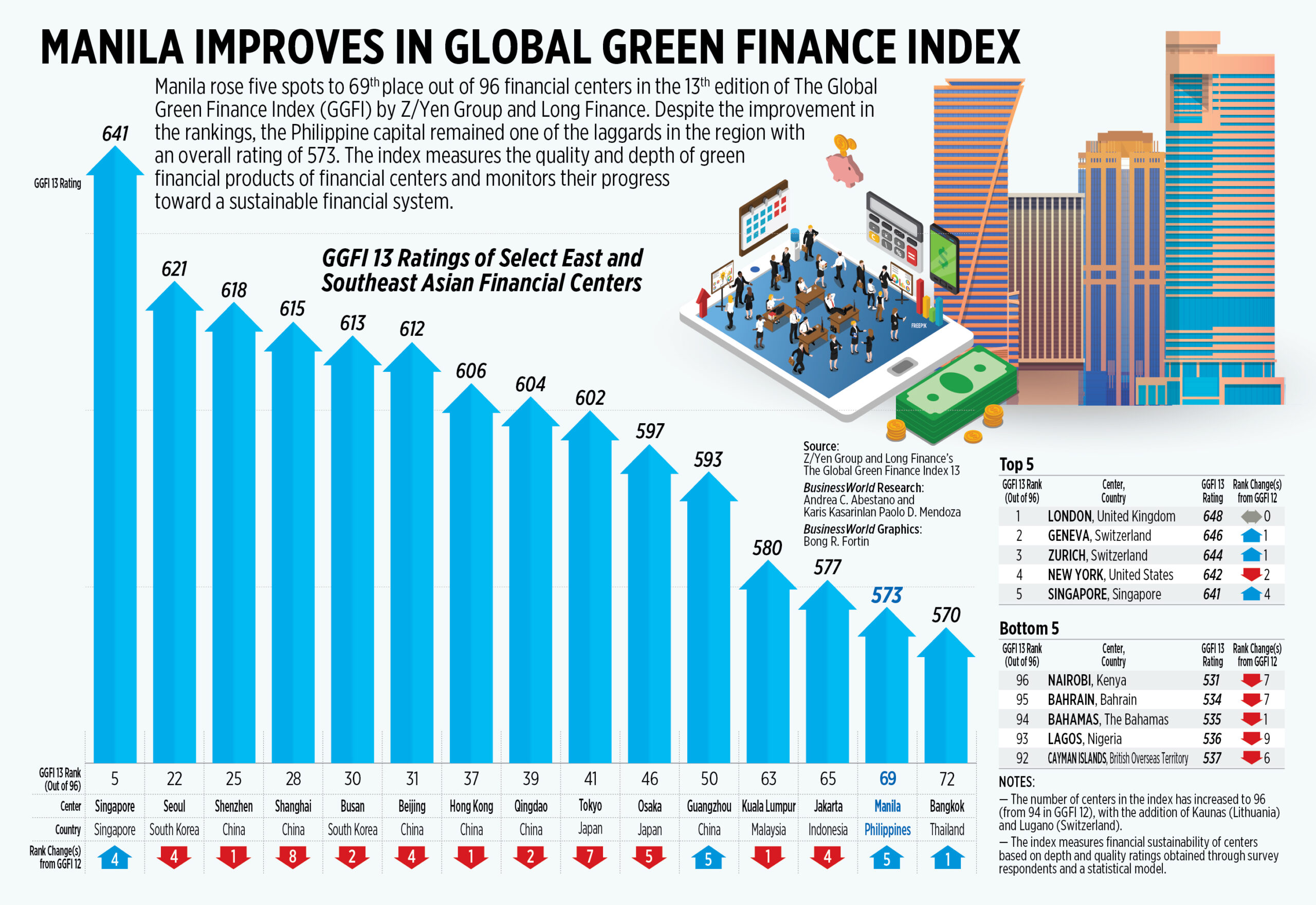




Policy Rate Updates: BSP outlook — cloudy with a chance of rate cut
 DOWNLOAD
DOWNLOAD

January Economic Update: Growth slows, prices rise
 DOWNLOAD
DOWNLOAD

Inflation Update: Up, up, and away?
 DOWNLOAD
DOWNLOAD


Manila jumps five spots in Global Green Finance Index

Manilamoved up five spots in the latest ranking of financial centers based on their green finance performance, according to London-based think tank Z/Yen Group.
In the 13th edition of the Global Green Finance Index (GGFI), Manila ranked 69th out of 96 financial centers. This was better than its 74th ranking in the previous edition.
Manila’s rating also increased to 573 from 536 previously.
The index utilizes quantitative measures and survey of finance professionals’ assessments on the quality and depth of green finance products in financial centers.
“There appears to be strong confidence in the development of green finance in financial centers, with every center’s rating in the index moving up in this edition, and the average rating up 4.21% compared with GGFI 12,” according to the report.
In the Asia-Pacific region, the Philippines lagged behind its neighbors and ranked 18th overall. Singapore was the top performer in the region, followed by Seoul, Sydney, Shenzhen and Shanghai.
“Almost all centers in the region fell in the rankings, with only Singapore, Guangzhou, Manila, and Bangkok improving,” the report said.
Among select East and Southeast Asian cities, the Philippines ranked 14 out of 15 financial centers.
Overall, London ranked first in the index. This was followed by Geneva, Zurich, New York, Singapore, Luxembourg, Washington, D.C., Los Angeles, Stockholm and Montreal.
“The centers which perform well in the GGFI continue to be places that are committed to environmental development across the economy as well as directly in finance, and in building their skills for green finance for the future,” the report said.
The bottom performers were Nairobi, Bahrain, the Bahamas, Lagos, and Cayman Islands.
Respondents cited energy efficient investment, disinvestment from fossil fuels and green insurance as areas of green finance with the “most impact.”
“Risk management frameworks, international initiatives, and renewables are listed by respondents as the major drivers of green finance,” it added.
Respondents identified factors that most affect the uptake of green finance, such as regulatory environment, availability of skills and taxation, among others.
Among the interesting initiatives in green finance cited by respondents include biogas, sustainability-linked bonds, carbon credit exchange platforms, green and sustainable finance taxonomies, green insurance, blended finance and utilization linked finance.
The Philippine government has been looking for ways to promote sustainable and green finance.
In February, the Monetary Board approved the sustainable finance taxonomy guidelines which aim to “advance sustainable finance in the country.” It serves as a tool to classify whether an economic activity is environmentally and socially sustainable.
The Philippine central bank also approved in December the gradual reduction in the reserve requirement rate for green, social, sustainability and other sustainable bonds to encourage banks to extend more loans for green pro-jects. — Luisa Maria Jacinta C. Jocson
This article originally appeared on bworldonline.com





 By BusinessWorld
By BusinessWorld
